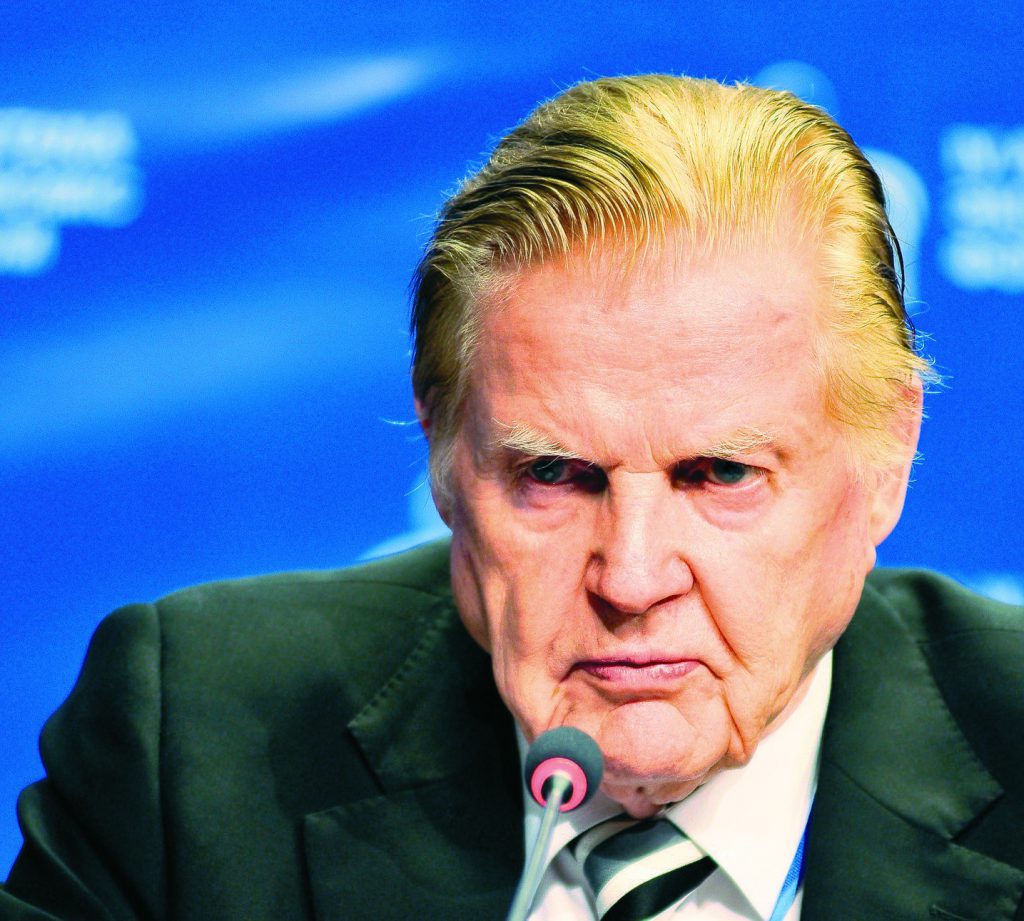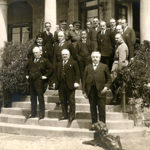
Published April 7, 2021
Publications
Robert A. Mundell died this week at age 88 at his beloved Tuscan villa, accompanied by his wife Valerie and son Nicholas. When he was awarded his Nobel in economics in 1999, I remarked, “I’m not sure that even his closest friends have succeeded in conveying exactly why Mundell is regarded as a great economist, even by those who have disagreed with him.” The piece republished below, from 1999, is my effort to explain that fact.
* * *
In October, the Royal Swedish Academy of Sciences awarded the Nobel Prize in Economics to Robert A. Mundell. The Nobel Committee cited Mundell “for his analysis of monetary and fiscal policy under different exchange rate regimes and his analysis of optimum currency areas.”
It may seem that the Nobel announcement, and press articles and editorials describing the award, have honored Mundell “far above our poor power to add or detract.” Nevertheless, I’d like to put in my two cents, not only to acknowledge an intellectual debt, but also because I’m not sure that even his closest friends have succeeded in conveying exactly why Mundell is regarded as a great economist, even by those who have disagreed with him.
In explaining the award, the Nobel committee noted that “Robert Mundell has established the foundation for the theory that dominates practical policy considerations of monetary and fiscal policy in open economies.” Practically speaking, this includes the whole range of problems that have dominated the headlines these past few years about “emerging market” countries in Asia, Latin America and Eastern Europe. The Columbia University professor was .also cited as the theorist of “optimum currency areas,” an idea which has borne practical fruit in this past year’s institution of the Euro, of which Mundell was an advocate. Most of the articles cited in the announcement were included in Mundell’s book. International Economics, which was published in 1968.
The trouble, as everyone who knows Mundell recognized, is that such an explanation is far too narrow to do him justice. (It was my pleasure to get to know Mundell when I worked for then-Congressman Jack Kemp from 1979 to 1988. Mundell was the pre-eminent theorist among a high-powered bunch of supply-side economists that often met in Kemp’s Congressional office before and during the Reagan Administration.)
What Mundell and a handful of others did, among other things, was to rehabilitate and update a “classical” view of the economy which had been shoved aside by the dominance of Keynesian theorists. Mundell is generally credited with the idea of the “policy mix” which was the essence of Reaganomics and a sharp departure from Keynesian orthodoxy.
As explained by Wall Street Journal editor Robert Bartley, ‘To combat stagnation plus inflation, you needed two levers: tight money to curb inflation, and tax cuts to promote growth. … In a Keynesian world, of course, tight money would merely offset tax cuts; one would contract aggregate demand while the other expands it. The key was that supply-side tax cuts provided stimulus not by expanding aggregate demand – ‘putting money into people’s pockets’ – but by stimulating supply, by increasing incentives to work and invest.”
Mundell’s economic theories shade imperceptibly into a philosophical world-view, rich with millennia-spanning historical perspective. This view was popularized in The Way the World Works by Jude Wanniski (with a strong admixture of Wanniski, a political philosopher in his own right), and in the editorial pages of the Wall Street Journal. Mundell also articulated his views in a little gem of a book called Man and Economics (McGraw-Hill, 1968). It’s one of the few books accessible to the layman that can guide him through the labyrinth of principles, problems and policies of political economy in only 200 pages — all spiced with the author’s original and whimsical poetry!
Since the Nobel announcement was silent on this, some of Mundell’s supply-side colleagues hastened forward with a broadening perspective. “It is a large mistake,” the Wall Street Journal editorialized, “to try to shelve Bob Mundell in the pigeonhole of ‘international economics.’. . . In terms of actual policy initiatives, Robert Mundell has been the most influential economist since John Maynard Keynes.”
‘The first word that came to mind when I heard that Robert A. Mundell had just won the Nobel Prize in economics was vindication,” Arthur Laffer wrote. ‘Back in the 1960s, Mr. Mundell, who then taught at the University of Chicago, was considered beyond the fringes of main-stream economics. He was the leader of a small group of economists – most of the time I thought it was just the two of us -who advocated fixed exchange rates, warned of the impending inflation if the U.S. went off gold and called for tax cuts to spur economic growth. Many in the profession called him a kook. Today they call him a Nobel laureate.” Laffer concluded: “Mr. Mundell deserves an even greater honor — to be recognized as the best economist of the century.”
Another supply-side friend, Larry Kudlow, who is chief economist at Schroder & Co., gave a similar assessment: “Over time, I believe the new free-market technology-driven global economy will be-come more and more Mundellian. That is why I ranked Bob Mundell and Art Laffer the two most important 20th century living economic greats in my book, ‘American Abundance,’ published two years ago. (Classical Austrian technologist Joseph Schumpeter remains my favorite dead economist.)”
Most of the reactions to Mundell’s Nobel Prize that I’ve read have followed one of these two descriptions — pioneer in inter-national monetary economics, or pioneer in the supply-side movement. And the fact that supply-side economics has al-ways been controversial may explain, on the one hand, a certain combativeness or defensiveness in the tone of supply-siders in greeting the award; and on the other hand, a certain cattiness on the part of those who have always disliked supply-side economics (“An eccentric, white-haired figure who once bought an abandoned castle.. . “; “Ever the maverick, Mr. Mundell remains a fan of the gold standard and fixed exchange rates at a time when they’re out of favor with most other economists”; ‘Perhaps surprisingly, given Europe’s sclerotic labour markets this year’s Nobel prize winner is a strong supporter of the euro,” etc.).
But even by taking the two views together, and averaging them out, it doesn’t explain why Mundell is so highly respected among economists, even those who violently disagree with supply-side economics. To do so, it’s necessary to understand a couple of things.
First, unlike most kinds of economic theory – such as, say, the economics of the labor market, or the theory of the business firm – monetary theory is not, properly speaking, a specialty. Because money is part of every transaction in a market economy, a monetary economist is required, not just to understand the money market, but to have a theory that integrates all of the elements of the economy. Similarly, to be an international monetary economist does not mean specializing in certain kinds of economic relations between countries, but rather having a theory that embraces the whole world economy.
Also, trying to rank economists solely by identifying their uniquely original contributions ignores a fundamental fact about economists (which is perhaps true of experts in any field): really fruitful theorizing is essentially a collaborative effort. Ideas emerge, take shape, are developed, preserved and handed on, all within the conversation of a community – some of its participants living, but others not disqualified by the mere accident of having died. Really great economists are less interested in saying something original than in saying something true. In fact their “originality” often consists precisely in rediscovering or rehabilitating some old idea because it is true.
It isn’t possible to appreciate Mundell’s work without knowing that he began as a junior member in a colloquy that had been going on for decades when he arrived; but he soon established himself as an equal, or more. Mundell recognized in the early 1960s that the Keynesian revolution in economics, dominant among American and British economists after the Second World War, contained some serious shortcomings. ‘The Keynesian model is a short run model of a closed economy, dominated by pessimistic expectations and rigid wages. This model is not relevant to modern economies,” he wrote in Monetary Theory (1971).
In seeking an alternative to Keynesian theory, Mundell had to return to much older sources, such as the eighteenth-century ideas of David Hume and the 19th-century general-equilibrium theory of Leon Walras. ‘The object,” Mundell explained, “is to combine the essential features of the specific models of Hume, [Irving] Fisher and Keynes in a more general theory of interest, inflation, and growth of the world economy. I do not claim to have resolved all the problems associated with a new approach, but only to have helped build, with able predecessors and contemporaries, a better foundation for monetary theory.”
In doing so, Mundell could draw on a Continental European tradition including economists like Robert Triffin and Jacques Rueff, which had always maintained the classical teachings; but many of their writings were (and remain) unfamiliar to English-speaking economists, and were not expressed in the mathematical form that became standard at about the same time as Keynesian macroeconomic theory. (It’s interesting that the return of American and British economists to the fold of classical economics was mediated largely by Canadian-born economists like Mundell and Harry Johnson.) As Mundell noted at a 1967 international monetary conference, “I do not know why it has taken so long for Anglo-Saxon economists to admit the truth of the elementary proposition [Rueff] is making: that there is an adjustment mechanism that is automatically operative under fixed exchange rates if it is allowed to operate.” It’s fitting that in 1983 Mundell was awarded the Jacques Rueff Prize in Paris by the Jacques Rueff Foundation and the Lehrman Institute.
In short, Mundell did not only advance the frontiers of economic theory in an arcane specialty known as “international economics,” or give good policy advice to American presidential administrations. He also managed to synthesize a tremendous body of theoretical elements into a coherent and elegant pattern, which was itself Mundell’s original contribution. And in constructing that synthesis, Mundell was always careful and generous in acknowledging the sources of its elements: economists as diverse as Irving Fisher, Frank Knight, John Maynard Keynes, Paul Samuelson, Lloyd Metzler, Don Patinkin, Milton Friedman and James Tobin. To do this required not only tremendous competence – but also remarkable tact.
Characteristically, Mundell has generally won his points, not by disproving or belittling an opposing view, but rather by judiciously allowing each view its proper place – and then transcending it. I believe it was Lord Lionel Robbins, also a great economist, who once remarked, “Bob is seldom wrong; and — here I lay down some kind of law— even when you disagree, you do so with your hat in the hand.”
John D. Mueller is the Lehrman Institute Fellow in Economics and Director of the Economics and Ethics Program at the Ethics and Public Policy Center.












